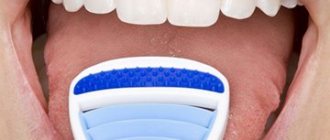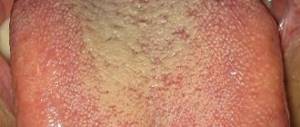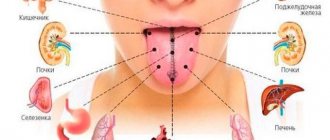The diagnosis of macroglossia is made if the tongue becomes excessively enlarged and thickened. With macroglossia, this muscular organ is pathologically changed or has some anomalies in its structure. This usually occurs due to developmental disorders of the fetus or is a consequence of some pathological process in the body. With this disease, the tongue becomes covered with folds, which further interfere with its proper dynamics. More often the disease occurs in childhood.
If the normal weight of the tongue is from 60 to 80 grams, then with this pathology it “grows” to 120 grams or more.
Both the entire organ and its individual parts (lateral surfaces, back or tip) can increase in size. Because of this, teeth marks may be imprinted on it. Often the tongue may not fit in the mouth and protrude outward.
Causes
Macroglossia can be either a local (local) manifestation or have a generalized nature. This disease can occur in many pathologies of the human body. As an independent disease, macroglossia can occur when:
- inflammation involving the lingual area (low glossitis of the tongue):
- rhinoscleroma with spread to the upper respiratory tract;
- open bite;
- acute angioedema;
- with the accumulation of pus due to an abscess in the oral cavity;
- a progressive cyst or tumor with damage to blood vessels (lymphatic or circulatory);
- hemorrhages accompanied by a rush of blood to the lingual tissue;
- “neurologically flaccid” tongue syndrome;
- impaired venous or lymphatic drainage in the lingual tissue;
- oral candidiasis.
However, macroglossia often occurs with such serious congenital damage to the body as:
- cretinism or other organic brain abnormalities;
- genetic disorders (Down syndrome, etc.);
- hypofunction of the thyroid gland and the development of myxedema;
- acromegaly.
Also, increased sizes of tongue tissue can accompany metabolic diseases such as:
- amyloidosis (deposition of amyloid in the tongue, when it becomes waxy, dense, with smoothed papillae);
- glycogenosis;
- pellagra (tongue red and ulcerated).
Often, forward displacement of the tongue can be observed in children as a consequence of their bad habit of tongue sucking.
Macroglossia is sometimes misdiagnosed in people with a small lower jaw.
The disease is often called “constitutional”, as it is common in obese men who have an increased love for food.
Macroglossia also occurs in severe infectious diseases such as tuberculosis or syphilis.
Causes of pain
The tongue is an organ involved in making sounds and pushing food and drink down the throat. When problems arise, it becomes difficult or impossible to perform natural functions. Therefore, it is important to know what causes pain at the root of the tongue.
9 Main Causes of Tongue Pain
The causes of the painful condition include:
- Inflammatory processes occurring in the palatine and lingual tonsils.
- Inflammation of the tissues of the tongue, pharynx and larynx.
- Mechanical or chemical injury to an organ.
- Progression of tumor formations.
- Diseases of the sublingual salivary gland.
- Inflammatory processes in the lymph nodes.
Pain in the tongue can be either a symptom or an independent disease.
Symptoms
Macroglossia can be true or false. Sometimes abnormal development of the jaw arch is mistaken for an increase in lingual tissue. In case of recession or congenital narrowness of the jaw, this ailment is considered false. With true macroglossia, the tongue is enlarged by one and a half to two times. However, this form of the disease occurs rarely.
Macroglossia in newborns
It is important to identify this disease in a timely manner, as this will greatly affect the success of its treatment and the likelihood of it becoming chronic.
Therefore, it is especially important to identify such pathology during the neonatal period.
When examining a newborn, it is important not to miss such manifestations of the disease as:
- enlargement of the tongue when it protrudes beyond the mouth;
- “varnished” or dried surface;
- tuberosity, enlarged papillae;
- blocking of the larynx by the root of the tongue, which forces the baby to refuse food;
- slightly open mouth;
- labored breathing;
- excessive salivation;
- frequent attacks of asphyxia (breathing problems);
- frequent infection and increased body temperature;
- deterioration of general condition.
Very often, children in the first year of life experience a local form of the disease. Often tongue pathology occurs in the fetus for the following reasons:
- improper development;
- idiopathic diseases with symptoms of hypertrophy of the lingual muscles;
- the formation of cysts or cavities during the formation of the tongue muscles;
- with adverse factors affecting the pregnant woman’s body (intoxication, radiation, infections).
Swollen tongue
Swelling of the tongue causes severe discomfort in the patient. A swollen tongue makes it difficult to talk, swallow, and sometimes even breathe.
When it swells, it increases in size, swells, and sometimes does not even fit in the mouth. This is a rather dangerous condition, since a severely swollen tongue can block the airways, and a person may simply suffocate.
We will tell you why the tongue swells, what to do in this situation and how to treat it.
articles:
Swollen after puncture
Many patients complain that their tongue is swollen after piercing. In most cases, this swelling is not pathological. The tongue was injured during the puncture process, and slight swelling is completely natural and natural.
Therefore, it is necessary to strictly adhere to the recommendations of the specialist who performed the puncture, keep the oral cavity clean, and rinse your mouth with antibacterial drugs.
However, if the swelling does not go away within 4-5 days, and purulent exudate forms at the puncture site, you should immediately consult a doctor, since various complications often arise with tongue piercing.
Normally, healing after a puncture occurs within two weeks. During this period, the tongue may swell, hurt, and the patient may experience a feeling of discomfort, burning, and soreness. In the future, all these unpleasant symptoms will disappear, and after two weeks the wound should heal without a trace, and the swelling should go away.
Swollen lips
As mentioned above, the tongue and lips most often swell at the same time due to allergies. In this case, swelling occurs rapidly, literally in a matter of minutes.
Along with a swollen tongue, the patient may experience other unpleasant symptoms, such as a runny nose, sneezing, mild cough, vomiting and abdominal pain.
If no measures are taken, then other symptoms may appear a little later - such as increased body temperature, changes in body color and sensitivity, and soreness and swelling of the tongue.
Many in this situation are lost and do not know what to do if the tongue is swollen and the patient apparently has an allergic reaction. You should not panic, you need to act quickly and clearly. You need to urgently call an ambulance, and before it arrives, give the patient an antihistamine, open the windows wide and provide access to fresh air, and avoid contact with the allergen (if known).
Swollen throat
If the tongue and throat are swollen at the same time, this condition is life-threatening for the patient. In the vast majority of cases, this condition occurs during anaphylactic shock (the most severe manifestation of allergies).
Only an experienced doctor can remove a patient from a state of anaphylactic shock, therefore, at the first signs of swelling of the tongue and throat, you should immediately call an ambulance, especially if the patient has other dangerous symptoms - such as difficulty swallowing, bluish coloration of the lips and nails, swelling of the eyes and lips, small rashes, low blood pressure, nausea, shortness of breath or choking.
Manifestations of chronic macroglossia
Often, tongue enlargement that is not cured in time leads to a severe chronic course of the disease. In this case, in an adult, the following manifestations of this pathology can be identified:
- the volume of the tongue is significantly increased, its movements are limited;
- the mouth is constantly slightly open;
- the lingual surface is rough, often with cracks or blue bloody blisters, with increased bleeding;
- copious amounts of saliva;
- permanent injury to the tongue tissue from dental crowns;
- speech is slurred, unclear, pronouncing words with difficulty.
Carrying out diagnostics
It is best to diagnose macroglossia in utero. Currently, with ultrasound of the fetus, norms for the size of any of its organs at various stages of pregnancy have been developed. There are optimal sizes for the length and width of the tongue. Often, during intrauterine examination, protrusion of the tongue outside the mouth is noticeable.
The final conclusion is given by specialists after several ultrasound examinations over 1 – 2 months.
More often, a full diagnosis can be established only by the 30th week of pregnancy.
After the birth of a baby with this pathology, he will need a number of consultations with an ENT doctor, an infectious disease specialist, a geneticist, an endocrinologist, and an oncologist.
And only after a detailed examination (using clinical analysis and instrumental methods) is a treatment plan for the disease developed.
Diagnostics
To make a diagnosis, you should consult a dentist. If the cause is not of a dental nature, then you need to undergo an examination to identify the true causes of the disease. The following methods are used for diagnosis:
- collection . At the first visit, the patient outlines complaints, existing allergic reactions or injuries, chronic diseases, etc.
- Visual inspection. The doctor assesses the patient's condition based on the existing signs. If it is possible to eliminate the problem immediately, surgical manipulations are carried out. For example, removing a bone from the tongue.
- A clinical blood test to determine the presence of an inflammatory process in the body.
When a disease is detected, the doctor determines treatment tactics.
Consequences of macroglossia
Sometimes patients do not perceive macroglossia as a serious pathology and do not contact specialists in a timely manner. However, such a defect in the body as a large tongue can cause a person a lot of inconvenience and serious complications. First of all, the condition of the patient’s dentition is seriously disturbed. The tongue itself suffers from excessive dryness and is often injured and inflamed.
Also, an enlarged tongue interferes with the normal socialization of children, being a cosmetic defect. Most patients acquire psychological complexes.
After all, not all of their peers are ready to be friends with children whose tongues stick out, their speech is slurred, and there is also a constant flow of saliva from their mouths.
However, this is not all. With a long course, the disease often leads to the following pathologies of the body:
- breathing problems and the habit of breathing through the mouth;
- problems with diction (especially pronouncing hissing sounds);
- violation of the formation of the dentofacial apparatus with pathologies of the formation of dentition;
- digestive problems (the appearance of ulcers, colitis and gastritis) due to difficulties in chewing food.
In addition, an untreated disease causes pain and constant discomfort in the mouth. The tongue is inflamed, enlarged, stiff, and even subject to constant biting.
Causes of tongue getting in the way
Tongue edema is a condition in which the tongue increases in size.
The entire tongue may swell, or one area - the tip, base (root of the tongue), one side - left or right. Sometimes swelling spreads to the larynx, gums, palate, lips, and taste buds on the tongue. Extensive swelling can cause difficulty breathing, eating, and speaking.
Weak and short-lived enlargement of the tongue is most often a manifestation of a common infection or minor injury. But if the swelling does not subside, this may indicate a serious health problem.
Signs of tongue swelling
Here is a list of symptoms that may accompany tongue swelling:
- difficulties chewing, swallowing, talking;
- changing its color;
- difficulty breathing in case of severe swelling;
- swollen lymph nodes under the lower jaw;
- bumps, ulcers, and irritated areas may appear on the tongue;
- pain and burning sensation in the tongue and throat;
- fever, chills and headache;
- bleeding even with slight injuries to the tongue;
- swelling of the lips, throat, gums, and taste buds on the tongue.
Causes
There are many reasons that lead to swelling of the tongue, we will list the most common ones.
Injuries
The most common cause of a swollen tongue is injury (accidental biting, burns, damage from dental instruments, recovery from oral surgery, piercing).
Tongue injuries often occur during attacks of epileptic seizures. The jaw reflexively clenches and bites it. Caregivers can damage the tongue while trying to prevent the epileptic from swallowing it.
Chewing tobacco also irritates the tongue and can cause swelling.
Allergic edema
A common cause of swelling is allergies. The tongue swells after eating allergenic foods or being stung by a bee or wasp. Other allergens are ACE inhibitor drugs used for heart diseases, non-steroidal anti-inflammatory drugs (ibuprofen, aspirin, naproxen).
With allergic urticaria, which can be caused by any allergen, there is a strong feeling of itching and the tongue becomes blistered.
Allergic edema usually develops suddenly. Often not only the tongue swells, but also the lips and gums, swelling appears on the face, and the eyelids swell.
Other symptoms of an allergic reaction are sneezing, runny nose, cough, skin rash, gastrointestinal symptoms (vomiting, stomach upset).
A serious allergic reaction, anaphylactic shock, develops very quickly. Symptoms that require immediate medical attention are swelling of the larynx, shortness of breath, rapid breathing, severe pain, severe swelling at the site of allergen injection.
Diseases
There are a number of diseases that can lead to tongue swelling.
Amyloidosis
Amyloidosis is a disorder of protein metabolism that often develops in older people. With this disease, the tongue gradually enlarges and swelling persists for a long time.
Tongue cancer
The early stage of tongue cancer is characterized by painless ulcers and bumps on this organ, as well as reddened areas or white spots on the surface of the mucous membrane. The tongue gradually increases in size.
Later stages of the disease are accompanied by pain, bleeding from the mouth, numbness in certain areas of the oral cavity, and a constantly sore throat. Problems with eating and speech quickly arise.
Tongue cancer can be successfully treated if the disease is diagnosed early enough. If you notice similar symptoms that last more than two weeks, you should consult a doctor.
Herpes virus
The symptom of herpes is not only a “cold on the lips”. With herpetic lesions of the tongue, swelling is usually accompanied by pain and the appearance of blisters on the surface of the tongue.
The blisters disappear after one to two weeks, but antiviral medications such as acyclovir can speed healing.
Fungal infection
Fungal infections of the oral cavity often occur in children, in adults after treatment with antibiotics, or when immune defenses are weakened.
With oral thrush, the tongue is covered with areas of thick white coating that are difficult to remove. Often the tongue is swollen and painful.
Fungal infections are quickly and easily treated with antifungal drugs, such as fluconazole. If thrush occurs frequently in an adult, you should check your immune status and take an HIV test.
Thyroid deficiency (hypothyroidism)
Hypothyroidism is a metabolic disorder in which the thyroid gland does not produce enough hormones. Symptoms of hypothyroidism include fatigue, depression, dry skin, weight gain, muscle weakness, joint pain, thinning hair.
Sometimes, with thyroid deficiency, swelling of the face is observed. The tongue swells and teeth marks are often visible along the edges.
Scarlet fever
Scarlet fever is a bacterial infection that most often occurs in children between the ages of five and fifteen.
Symptoms of the disease are a small red rash, sore throat, nausea, high fever, and enlarged lymph nodes in the neck. On the second to fourth day, the tongue becomes smooth, bright red and swollen.
Sometimes the tongue is initially coated with a white or yellow coating, which disappears after a few days, leaving a smooth, crimson-colored surface.
Inflammation of the tongue (glossitis)
When inflamed, the tongue increases in size, the surface becomes smooth and burgundy. There is a pale white coating.
Inflammation develops against the background of allergies, after injury. The development of glossitis can be provoked by infection, burns from hot food, alcohol abuse, insufficient saliva, smoking, and hormonal factors.
Ways to combat glossitis are good oral hygiene and a gentle diet. If the inflammation is infectious, antibiotics are prescribed.
Angioedema
Angioedema is a condition of an allergic nature, but is sometimes inherited. As a rule, the lips, mouth, throat, and tongue are involved in the process. There is no itching, skin color does not change.
The size of the swelling increases rapidly. Unlike urticaria, this type of allergic reaction affects a deeper layer of tissue.
If swelling affects the mucous membrane of the throat, suffocation and death can occur.
Other diseases that cause swelling of the tongue
Below is a list of other medical conditions that can cause tongue swelling
- Infection due to advanced caries
- Herpangina with ulcers caused by the Coxsackie virus
- Anemia caused by vitamin B12 deficiency
- Multiple myeloma
- Kawasaki syndrome
- Streptococcal infection
- Syphilis
- Problems with the pituitary gland
- Rhabdomyolysis
- Leukemia
- Neurofibromatosis type 1 or oral neurofibroma
- Sarcoma
- Inflammation of the taste buds on the tongue
- Genetic diseases such as Down syndrome or Beckwith-Wiedemann syndrome
Swelling of the tongue due to dehydration
With a lack of fluid in the body (dehydration), a feeling of dryness occurs in the mouth, the tongue increases in size and becomes covered with cracks. Other symptoms of dehydration include dry and cracked lips, loose dry skin, bright yellow urine, burning when urinating.
If such symptoms appear, you should drink enough fluids. Dehydration is a serious condition that can lead to death.
Swelling under the tongue (“ball under the tongue”)
Inflammation of the salivary gland under the tongue
If swelling occurs under the tongue, this indicates a problem with the salivary glands. There are many reasons for this condition - infection, stones in the salivary glands, mumps, HIV, influenza, parainfluenza type 1 or 2, herpes, tumor, poor oral hygiene.
Swelling on one side of the tongue
Swelling of the tongue on one side
Unilateral swelling of the tongue does not indicate a specific disease; it can also be caused by a number of diseases - bacterial infection, herpes virus, tumor.
Sometimes one side of the tongue swells after an injury - a burn, a bite, or after surgery. An allergic reaction and angioedema often affects a specific area of the tongue - the tip, left or right side.
Swollen tongue after piercing
Swelling of the tongue after puncture
After a piercing puncture, the tongue swells. The swelling usually subsides within a few days.
But if the piercing causes infection in the tissue of the tongue, it may remain swollen for several months or even years. Signs of a bacterial infection include redness, discharge from the tongue, bleeding, abscesses, bumps or blisters on the tongue.
Edema in children
Swelling of the tongue in children can be caused by many reasons - allergies, injury, inflammation, dehydration. If swelling occurs, you should consult a doctor.
Swelling with teeth marks around the edges
Swelling of the tongue with teeth marks
Sometimes the swollen tongue shows marks from the teeth along the edges.
This tongue occurs when there is a lack of nutrients in the body, problems with the thyroid gland, water retention in the body (due to diabetes, enlargement or inflammation of the liver).
Sometimes the condition can be caused by problems with the spleen, which is often accompanied by bloating and excess weight. If the problem is the spleen, then eating foods that are healthy for it (vegetables, herbs) can help.
Swelling of the tongue and sore throat
Swelling of the tongue in combination with a sore throat may be a sign of an allergic reaction, Quincke's edema, oral infection, mononucleosis, or oral cancer.
In an allergic reaction, a sore throat is accompanied by difficulty breathing, rash, and runny nose. Symptoms of viral mononucleosis are fever, feeling tired, enlarged and painful lymph nodes, headache.
Treatment
Treatment for tongue swelling depends on the cause of the condition.
Treatment of allergic edema
In case of allergic edema, first of all, you need to determine the allergen substance and eliminate contact with the allergen. Antihistamines and corticosteroids are used to treat allergies. In case of severe swelling, methylprednisolone, Benadryl, and adrenaline injections are used.
Treatment of infectious edema
To treat infectious swelling, you should consult a doctor. Bacterial infections are treated with antibiotics; for viral diseases, drugs are prescribed that reduce the symptoms of a viral infection.
Traumatic edema
Serious tongue injuries require medical intervention to stop the bleeding and reduce swelling. For minor injuries, you can apply a piece of ice to the tongue and use painkillers.
Treatment with home remedies
When treating edema, various home remedies that happen to be at hand can be used.
- To care for your tongue, use a soft toothbrush. Use a brush to gently clean your tongue periodically.
- A lump of sugar on the tongue can reduce swelling.
- A diluted turmeric solution (water and turmeric powder) reduces inflammation. Rinsing your mouth with a sea salt solution helps with both viral and bacterial infections.
- Another recipe is to use a mixture of mint, anise and rosemary for rinsing.
- Salt intake should be reduced as salty foods stimulate saliva production, which can cause problems if the tongue is swollen.
- Add chopped celery to your food.
- Drink small amounts of water regularly.
- Swelling can be reduced by placing a chilled spoon or ice cube on the tongue.
When to see a doctor
If swelling of the tongue has spread to the larynx, accompanied by suffocation, hemoptysis, or a feeling of constriction in the throat, you should immediately consult a doctor. You also need to undergo an examination if the swelling of the tongue does not go away for more than two weeks.
Source: https://glivec.su/2018/05/14/jazyk-meshaet-vo-rtu-prichiny/
Treatment
Treatment of macroglossia should be carried out taking into account the causes and factors that provoked the development of this disease. Specialists also take into account all changes (morphological or functional) that occurred during the course of the disease.
If an enlarged tongue is one of the manifestations of any disease, then paramount importance is given to the treatment of this “root cause” of the disease.
Drug treatment
If the disease occurs only locally (in the mouth), then drug treatment consists of local sanitation of the oral cavity and elimination of the cause of this disease.
If necessary, use general or local antibiotics, antiseptic and anti-inflammatory agents in the form of rinses or irrigations. Also, medications are necessarily used after surgery on the tongue to treat the wound and prevent secondary infection.
In addition, the drugs are also used for general diseases, when macroglossia is one of their symptoms. In this case, with the right treatment, the tongue shrinks on its own.
Surgical treatment
In severe cases of macroglossia, surgical treatment is more often used to correct the size of the tongue.
For such a radical method, there must be the following serious changes in the body:
- breathing problems;
- difficulty chewing and swallowing;
- serious aesthetic deviations in the facial area;
- open bite with the impossibility of using orthodontic treatment methods;
- constant drooling;
- speech therapy disorders (difficulty speaking and pronouncing sounds) that cannot be treated by a speech therapist.
During the operation, to normalize the size of the tongue, its wedge-shaped part is removed. In this case, the required part of the tongue is excised by a surgeon under general anesthesia, returning the organ to its normal size.
With an open bite, a prosthesis is usually installed to prevent the tongue from falling out of the mouth.
In cases of congenital form of the disease, children are often treated by ligation of the lingual arteries. This method slows down the growth of the tongue and allows you to restore optimal proportions.
In such cases, the prognosis for treating the disease is most often positive.
In case of tumor processes, treatment must be comprehensive, using surgical and chemotherapy methods, as well as drug and radiation therapy.
If you are diagnosed with macroglossia, you should not brush aside medical help and let everything take its course.
Indeed, in addition to constant discomfort in the mouth, people with a changed and enlarged tongue experience difficulties in communication, seriously worsening their own socialization. It is especially important to treat the disease as early as possible in children, preventing the occurrence of disorders in the dental apparatus and the formation of persistent psychological complexes in the child.
Sources used:
- Scully C, Porter S (July 2000). ABC of oral health. Swellings and red, white, and pigmented lesions"
- Perkins, J. A. (December 2009). "Overview of macroglossia and its treatment". Current Opinion in Otolaryngology & Head and Neck Surgery.
- "Therapeutic dentistry. Textbook" (Borovsky E. V.)
- “Diseases of the mucous membrane of the oral cavity and lips” (Bork K.)











